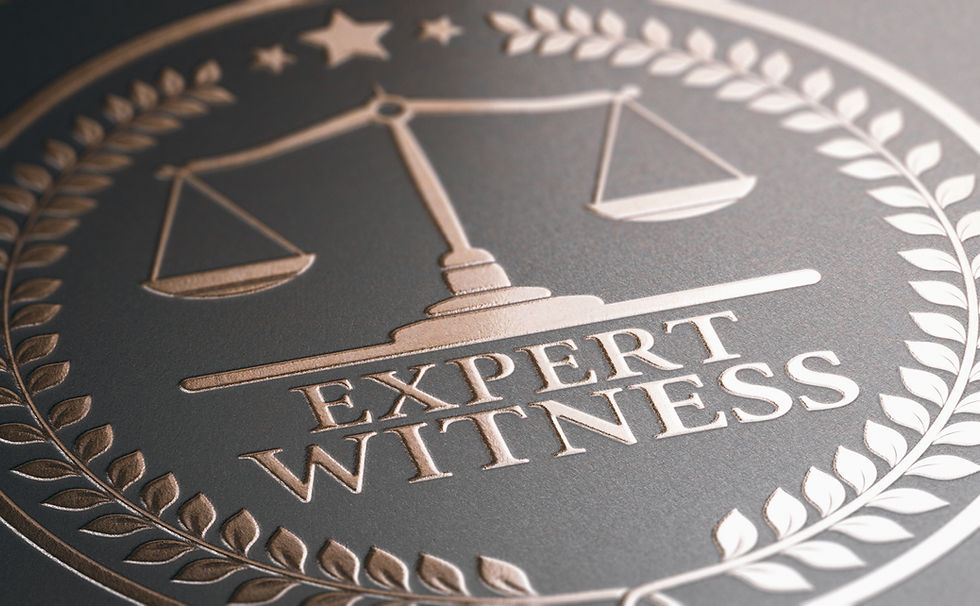Medical Expert Witnesses and Conflicts of Interest and Bias
- Danielle Marshall
- Jan 10, 2023
- 4 min read

There are a number of considerations that need to be made before an attorney hires an expert witness. Important things to think about are the expert's qualifications, reputation, and ability to communicate well. The location of the expert and the lawyer's budget are both matters of practicality.
Lawyers often forget about the possibility of a conflict of interest. Luckily, real conflicts don't happen very often. Experts are also called into question when it is said that they clearly favor the side that hired them. Even though these kinds of challenges rarely work, lawyers need to think about bias before hiring an expert witness.
Courts don't like to throw out experts because of conflicts of interest or claims of bias. Most of the time, courts see these issues as ones of credibility, not admissibility.
Even if a potential conflict does not bar an expert from testifying, lawyers want to hire credible experts. Attorneys must consider possible challenges to an expert's credibility based on alleged conflicts of interest or bias allegations. So, when a lawyer looks at a potential expert, he or she should check for conflicts of interest and bias.
Prior Work for an Adverse Party
When an expert has previously worked for the opposing party, the court may decide not to allow that expert to testify. Courts can prevent an expert who has "switched sides" from testifying if they deem it necessary "to protect the integrity of the adversarial process, safeguard privileges that might otherwise be violated, and enhance public confidence in the legal system."
Whether or not the expert will be disqualified from the case is typically contingent upon whether or not the expert received confidential information from the party that is relevant to the ongoing lawsuit. In the context of legal matters, confidential information may include a lawyer's assessment of the merits of relevant claims brought against the lawyer's client as well as the strengths and weaknesses of those claims.
When there is a dispute regarding the manner in which the expert obtained confidential information, the courts will inquire as to whether or not the opposing party had sufficient grounds to believe it had a confidential relationship with the expert. If that is the case, they examine the evidence to determine whether the expert was truly given confidential information.
The potential for a conflict of interest must be weighed against the possibility that it would be advantageous to retain the services of an expert who was previously retained by the opposing party. It's possible that the fact that an expert is willing to work for both sides can be taken as evidence that the expert is impartial. It is also possible to interpret this as evidence that the expert is a "hired gun," but this is a challenge that every hired expert must face in each and every one of their cases.
Lawyers must be careful when an expert has worked for the other side. There is always a chance that the opposing party will claim it disclosed confidential information to the expert. A lawyer will need to thoroughly investigate the expert's relationship with the opposing party in order to determine the likelihood that the expert will be disqualified. If the risk is significant, the attorney should consider whether there are any other experts who are equally qualified but do not have any potential biases.
Bias
It is common for the opposing party to accuse the other of being biased. Claims of bias may be made against an expert if that expert is consistently employed by a particular industry or group of litigants. However, these claims are attacks on the expert's credibility, which juries should resolve.
Bias may also be reflected in unreliable methodologies or a selective application of facts. Courts might disqualify experts for bias indirectly by applying the Daubert standard more strictly when there is evidence that bias may have affected the reliability of an expert’s conclusions.
Some courts have suggested that experts who base opinions on experiments or research done outside the context of litigation are more likely to produce reliable results than experts who are hired by a particular industry or group to form opinions that are specific to a lawsuit. After Daubert was remanded to the Ninth Circuit, Judge Kozinski wrote that “experts whose findings flow from existing research are less likely to have been biased toward a particular conclusion by the promise of remuneration; when an expert prepares reports and findings before being hired as a witness, that record will limit the degree to which he can tailor his testimony to serve a party’s interests.”
That line of thought implies that courts may be more inclined to exclude experts who have not conducted research or expressed opinions on a specific subject before being hired to present expert testimony. Choosing an expert who has researched a scientific question outside of the context of litigation may help to avoid bias claims.
Nonetheless, the fact that an expert did not conduct research prior to being hired does not imply that the expert's methodology will be tainted by bias. When, for example, an expert prepares peer-reviewed writings and fails to disclose "her potential bias because of her direct involvement in litigation in the... cases on which she reported," courts are more likely to be troubled.
Experts may also exhibit bias when they prepare reports that contradict prior writings or testimony given in other cases if the contradictions cannot be explained by the differing facts considered by the expert. To avoid potential bias claims, lawyers should always review an expert's previous writings and testimony to see if they contradict the opinions the expert will be asked to express.




Comments